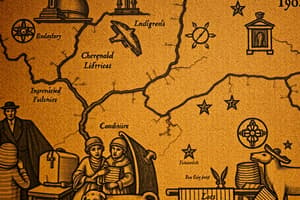Podcast
Questions and Answers
Which of the following is considered a primary source?
Which of the following is considered a primary source?
- History textbooks
- Encyclopedias
- Scholarly articles
- Diaries (correct)
Historiography refers to the study of how history is created and interpreted.
Historiography refers to the study of how history is created and interpreted.
True (A)
What is a key focus of political history?
What is a key focus of political history?
Government, power, and conflict
Historical research relies on __________ reasoning, meaning conclusions must be supported by evidence.
Historical research relies on __________ reasoning, meaning conclusions must be supported by evidence.
Match the following historical themes with their descriptions:
Match the following historical themes with their descriptions:
Which of the following approaches is NOT a methodology used by historians?
Which of the following approaches is NOT a methodology used by historians?
Historical periods are always clearly defined.
Historical periods are always clearly defined.
Why is interpretation crucial in historical analysis?
Why is interpretation crucial in historical analysis?
The study of history seeks to understand how humans have lived, developed, and __________ throughout time.
The study of history seeks to understand how humans have lived, developed, and __________ throughout time.
What does global history explore?
What does global history explore?
Flashcards
History
History
The study of past events, people, and societies.
Historical Methodology
Historical Methodology
Methods historians use to research and understand the past.
Primary Source
Primary Source
Original documents or objects from the past.
Secondary Source
Secondary Source
Signup and view all the flashcards
Historiography
Historiography
Signup and view all the flashcards
Historical Periods
Historical Periods
Signup and view all the flashcards
Historical Analysis
Historical Analysis
Signup and view all the flashcards
Historical Context
Historical Context
Signup and view all the flashcards
Political History
Political History
Signup and view all the flashcards
Historical Significance
Historical Significance
Signup and view all the flashcards
Study Notes
Historical Periods and Concepts
- History encompasses the study of past events, people, and societies.
- It seeks to understand how humans have lived, developed, and interacted throughout time.
- Historical study utilizes various sources, including primary sources (e.g., letters, diaries, artifacts) and secondary sources (e.g., scholarly articles, books).
- Historiography refers to the study of how history is written and interpreted.
- Historical periods are typically defined by significant societal changes or events, like the Renaissance, the Industrial Revolution, or World War II. These periods are not always clearly delineated.
Historical Methodology
- Historians employ critical thinking to evaluate evidence and sources. They meticulously analyze information to uncover patterns and relationships.
- Historical research relies on evidence-based reasoning, meaning conclusions must be supported by evidence from sources.
- Interpreting sources involves recognizing biases and perspectives, evaluating the context of the time, and considering all available evidence, including possible contradictions.
- Historians utilize various methodologies, including oral history, archaeology, and archival research, to gather different types of information from the past.
Key Historical Themes
- Political history examines government, power, and conflict.
- Social history focuses on how people lived, their interactions, and their diverse experiences.
- Economic history explores the development of economies and economic systems throughout history.
- Intellectual history investigates changes in ideas and thought across different eras.
- Cultural history studies patterns of beliefs, practices, and creative artifacts that showcase a culture.
- Global history explores the interconnectedness of events and societies worldwide.
Historical Analysis
- Historians examine cause-and-effect relationships, identifying factors that influenced historical events.
- Historical analysis also investigates consequences, understanding the long-term impacts of past events on present-day conditions.
- Historians often use historical context to provide an understanding of events. This context includes the social, political, and economic factors of a particular period.
- Interpretation is crucial to historical analysis.
Historical Significance
- Understanding the past illuminates present-day issues.
- Historical research helps to understand current political, social, and economic issues.
- Historical knowledge promotes informed decision-making as well as fosters empathy and understanding for diverse perspectives.
- Studying history often leads to new insights through the continual re-evaluation of evidence and interpretations in our ever-changing world.
Studying That Suits You
Use AI to generate personalized quizzes and flashcards to suit your learning preferences.



